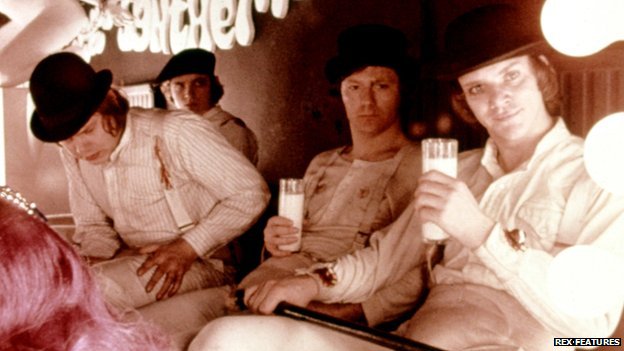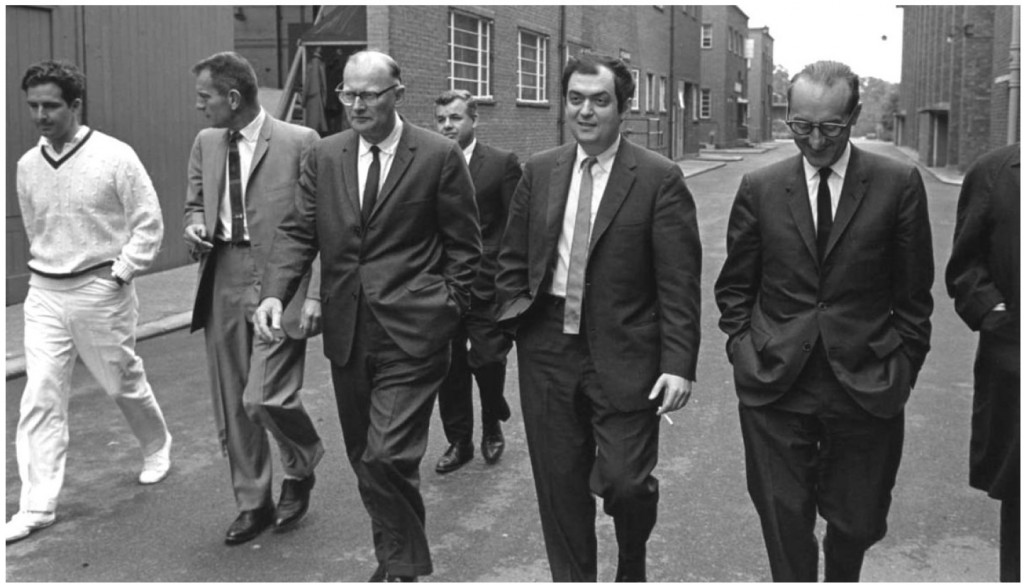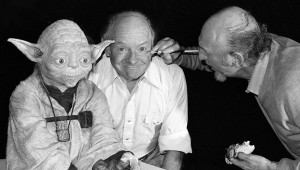Where there’s smoke there’s… Well, exactly what there is is a subject of debate in today’s Scroll.
(1) Do not miss – “Dilbert Writes A Sci-Fi Novel”.
(2) Oh brave New World! Scientists claim to have pinned down one of Shakespeare’s previously unsuspected literary influences —
South African researchers announced they found cannabis residue on pipe fragments found in William Shakespeare‘s garden.
Francis Thackeray, an anthropologist at Johannesburg’s University of the Witwatersrand and the lead author of the study published in the South African Journal of Science, said he and his team used gas chromatography mass spectrometry to analyze residue found on 24 pipe fragments from the bard’s hometown of Stratford-Upon-Avon, England, and cannabis residue was discovered on four fragments taken from Shakespeare’s garden.
(3) When Arthur C. Clarke introduced interviewer Jeremy Bernstein to Stanley Kubrick, he accidentally launched their 25-game chess duel.
I told Clarke that nothing would please me more. Much to my amazement, the next day Clarke called to say that I was expected that afternoon at Kubrick’s apartment on Central Park West. I had never met a movie mogul and had no idea what to expect. But as soon as Kubrick opened the door I felt an immediate kindred spirit. He looked and acted like every obsessive theoretical physicist I have ever known. His obsession at that moment was whether or not anything could go faster than the speed of light. I explained to him that according to the theory of relativity no information bearing signal could go faster. We conversed like that for about an hour when I looked at my watch and realized I had to go. “Why?” he asked, seeing no reason why a conversation that he was finding interesting should stop.
I told him I had a date with a chess hustler in Washington Square Park to play for money. Kubrick wanted the name. “Fred Duval” I said. Duval was a Haitian who claimed to be related to Francois Duvalier. I was absolutely positive that the name would mean nothing to Kubrick. His next remark nearly floored me. “Duval is a patzer,” is what he said. Unless you have been around chess players you cannot imagine what an insult this is. Moreover, Duval and I were playing just about even. What did that make me?
Kubrick explained that early in his career he too played chess for money in the park and that Duval was so weak that it was hardly worth playing him. I said that we should play some time and then left the apartment. I was quite sure that we would never play. I was wrong.
(4) The new Fantastic Four reboot is getting the kind of reaction that explains why the phrase “stinks on ice” was invented.
Not only were reviews scathing — resulting in a 9 percent fresh rating on Rotten Tomatoes — audiences on Friday night gave the $120 milliion Fox tentpole a C- CinemaScore, the worst grade that anyone can remember for a marquee superhero title made by a major Hollywood studio. (CinemaScore, based in Las Vegas, was founded in 1979.)
…For the weekend, Fantastic Four, starring Miles Teller, Michael B. Jordan, Kate Mara and Jamie Bell, topped out at a dismal $26.2 million from 3,995 theaters in North America, one of the lowest openings of all time for a Marvel Comics film adaptation
(5) Carrie Cuinn explained why Lakeside Circus killed plans to publish a Lou Antonelli story, what Antonelli did next, and the verbal attacks she received as a result.
I couldn’t stand by and do nothing after Mr. Antonelli publicly admitted to essentially SWATing someone in our community, especially given the numerous deaths by police and in police custody that have recently made the news. As I said in my letter, it’s a matter of SAFETY. Antonelli took away Gerrold’s safety when he filed that false police report, and I won’t support that by giving him my money or promoting his work.
I was content to do what I felt necessary privately, between Mr. Antonelli and myself, but he dragged me up in front of his fans and made a target of me. He knew people were defensive and angry on his behalf, and he gave them me as a target. Doing that, he took away my safety, too.
(6) Lou Antonelli says what happened wasn’t his intent, and apologized again.
I want to make it clear than when I posted about Carrie Cuinn and Lakeside Circus’ decision taking back their decision to publish a story of mine, I meant it as a cautionary tale – don’t be a jackass like I was, because there are repercussions. Experience is a hard teacher. I don’t begrudge the decision at all. I apologized to David Gerrold because I realized I did something stupid and I made a mistake. But I didn’t think I made a mistake in revealing Cuinn’s decision. Fact was. I thought people would commend her for it, and I thought there would be some people who would like to give her credit for it.
Now she says she’s gotten threats over the revelation. That’s not why I posted it! So I’m sorry again, in this case, because it never occurred to me her action would be seen negatively.
(7) K. Tempest Bradford has a take on the Antonelli/Gerrold story.
You hear all this, and your response is UGH, how terrible! That crosses a line! Antonelli should explain himself and apologize!
Oh? Really? A guy contacts a police department in a serious effort to have said police pay extra special attention to a convention attendee in an atmosphere where there’s already plenty to worry about with police overreacting and you want him to apologize?
Sure, Gerrold isn’t a young black man, so he’s already much safer around police than a lot of folks. But Antonelli’s intent was bring police into a situation for the purpose of causing alarm and harm to Gerrold for no other reason than that he can’t handle Gerrold having an opinion and a platform….
There are real ramifications here, real consequences. There may be a good chance nothing bad will happen. That doesn’t mean it’s okay. That doesn’t mean an apology is enough….
The difference between how we treat people from marginalized identities who do things harmful to our community and how we treat white men who harm our community is so stark, so blatant, that I feel like I’m living in a Onion article right now.
This is how you fail, white people of SFF. This right here….
(8) Some commenters are extrapolating Bradford’s post to mean that Benjanun Sriduangkaew, the subject of a report by Hugo nominee Laura Mixon, ought to be treated with comparable leniency.
Jason Sanford, for one, has written a post “On the double standard of genre apologies”.
Here’s a simple test. Can you figure out why the following situations are different?
- Lou Antonelli apologized. The genre is beginning to accept his apology, with many people wanting to act as if nothing happened.
- Harlan Ellison apologized. The genre accepted his apology and most people now act as if nothing happened.
- Benjanun Sriduangkaew apologized. Most people in the genre refuse to accept her apology.
(9) Ann Somerville sharply disagreed that these cases are comparable.
The crucial differences are – and Tempest fucking knows these:
- Antonelli does not carry out secret campaigns of abuse. He does everything, for good or ill, under his own name (which is now mud).
- He hasn’t been carrying out harassment of people, white/POC, male and female, straight and gay, cis and trans for over ten years
- he apologised for what he actually did, in full – unlike Miss Hate who sort of vaguely alluded to bad behaviour, without acknowledging the full scope of what she did or directly apologising to her actual victims
- his victims don’t include people of colour, but include one of Hate’s much loathed white women (that should make him a hero, according to Bradford and Hate)
- People don’t feel constrained from criticising Antonelli on account of his oh so persecuted race and sexuality – which is still the case with Hate (despite the fact she is massively class privileged and not racially disprivileged in her own country.)
(10) In an earlier post, Jason Sanford made an appeal for peace in the genre.
But this incident has also brought into focus how much bad blood there is in the science fiction and fantasy genre. The letter Lou wrote wasn’t merely an attack on David — it was an attack on Worldcon and the entire genre.
Which I’m certain isn’t what Lou intended. I have no doubt he loves the genre. I’m certain he wants the genre to thrive and grow.
We have reached the point in the SF/F genre where people must decide what they want. Because there are now two simple choices: To destroy the genre or reach for peace.
Reaching for peace doesn’t mean silencing your views or beliefs. Our genre has long been a big tent where all viewpoints and people can co-exist. Yes, the genre has often not lived up to this ideal. And that doesn’t mean there won’t be disagreements and arguments and people who hate each other.
But at the end of the day a shared love of science fiction and fantasy joins us together. We must never forget this.
(11) Though prompted by her experience at the BEA, not by this latest kerfuffle, Kameron Hurley’s article for Locus “Your Author Meltdown Will Be Live-Tweeted” seems prescient.
The more people respect what you have to say, the more folks will come out of the woodwork trying to tear you down. Having been one of the people flinging arrows at authors myself (and let’s be real, I still do), I get it, and I accept it, but that doesn’t make it any easier to navigate when you’re sitting in a restaurant and wondering if your dinner conversation will end up in an Instagram video.
In the ten years I’ve been writing online, I’ve mostly been hated as some kind of women’s lib boogeyman, and that’s just funny more than anything. It’s a lot easier for me to dismiss haters when they’re sending me death threats for believing women are people. It’s harder to dismiss people who want me dead because they despise me in general. In the same breath they’ll say I should be garroted to keep me from speaking and Starbucks should stop serving Pumpkin Spice Lattes because, gosh, those lattes are gross.
More and more, ‘‘being a writer’’ isn’t about writing at all. It’s about the writer as celebrity. The writer as brand. The writer as commodity. And more and more, I see authors themselves reviewed as if they’re businesses on Yelp.
(12) Is it possible that the extended edition of The Battle of the Five Armies could be even more violent than the version shown in theaters? TheOneRing.net theorizes that will be so —
According to a bulletin published today by the Motion Picture Association of America Classification and Rating Administration, the extended edition of The Hobbit: The Battle of the Five Armies will carry an “R” rating for “some violence.” Of course, it’s no news flash that the movie contains violence. The theatrical version’s PG-13 rating came with an advisory for “extended sequences of intense fantasy action violence, and frightening images.” So, it’s intriguing to imagine what, exactly, in the EE bridged that gap, especially with only “some violence” to go by. Possible EE spoilers ahead!
(13) The late Terrence Evans (1934-2015) is remembered at StarTrek.com:
Evans ventured to the Star Trek universe to play Baltrim, the mute Bajoran farmer, in the DS9 episode “Progress,” and Proka Migdal, the Bajoran who adopted a Cardassian war orphan, in “Cardassians.” He also appeared as the Kradin ambassador, Treen, in the Voyager hour “Nemesis.”
(14) Voice of Trillian in Hitchhiker’s Guide to the Galaxy, Susan Sheridan, has passed away. SF Site News has more at the link.
(15) I believe Matt!
For the record: None of my decision to break my five-year con-free streak by attending Worldcon has anything to do with the Hugo Awards.
— Matt Wallace is Updates Only (@MattFnWallace) August 10, 2015
[Thanks to Gregory Benford, JJ, Andrew Porter and John King Tarpinian for some of these stories. Title credit goes to File 770 contributing editor of the day Brian Z.]



